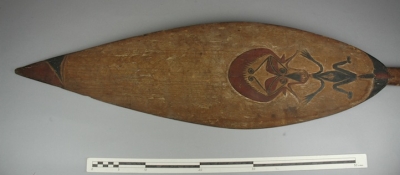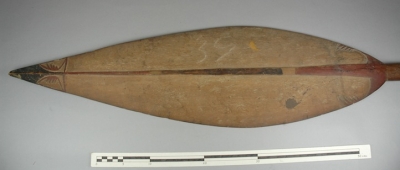To search the RPR site click here
A leaf-shaped paddle from Buka
Blue book entry [circa 1874] - Patterns consisting of animal and vegetable forms conventionalized in ornamentation 512 - 24 Paddles. Human figure shewing the transition by which the original designs have been lost and gradually converted into a crescent form. New Ireland Part p80
Written on object [?before 1884]- [in chalk] 35 or 5 and an 'E' like squiggle depending on what way up it is!
?Old General Pitt Rivers Label [before 1884]- 515
Delivery Catalogue I entry [1884] - Paddles of the New Irelanders Paddle wood painted and carved 515 Screen 176 177
Written on object [after 1884] - New Ireland PR coll Blue (515)
Accession Book IV entry [1920s] - 1884.61.1 - 65 Design - Development and Degradation of - 1884.61.29 - 41 Series of paddles with coloured designs to show possible degradation of design New Ireland (Buka type) Similar broader pointed blade [to 1884.61.30], with plain handle, grotesque figure (squatting) in coloured relief [Drawing]
Additional entry - 512 - 524 [1884.61.29 - 41] Blue Solomon Islands Buka formerly labelled New Ireland Buka paddles shewing development from man to crescent in PR coll. First reference by the General is when as Lane Fox he gave an address on Anthropology to the British Association. Transactions of the Sections. In 1872 page 168 paddles of 'the New Irelanders, one of the Papuan group of islands adjoining the one in which Bishop Patteson was lately murdered'. Bishop Patteson was murdered on Nukapu in the Santa Cruz group; the Solomon Group is next and then New Ireland. Distances are considerable. [BB]
Card Catalogue Entry [1940s] - Solomon Islands Buka (formerly labelled New Ireland) 515 Blue. Paddle; broad pointed leaf blade with plain handle; grotesque figure (squatting) in coloured relief No 3 in series to show possible degradation of design
Old General Pitt Rivers Label - Note that there is NO printed display label on this object, nor does it appear that there ever has been. This is the only paddle from this series which does not have one. The reason for the absence is unclear
1872 British Association address: – no mention
1875 ‘Evolution of Culture’: No mention







